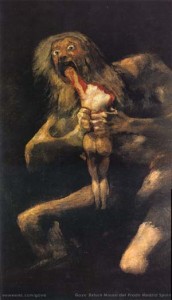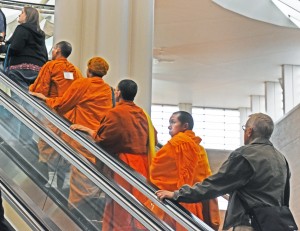As we enter the winter holiday season I am struck by the discord that seems to arise each year at this time over whom the holiday “belongs to”. It’s as if there is a conclusion that the celebrations of the season are limited to one religion only, that the celebrations are a finite commodity to be “owned” by one group or another. How silly. Just because I celebrate Yule, someone else celebrates Christmas, and another joins with family to honor Kwanzaa doesn’t mean that any of us impacts the meaning or observance of the holiday for another.
Midwinter celebrations have been a part of human life for thousands of years, well back into pre-history. For example, while we know very little about the builders of Stonehenge and the other stone circles across Europe, we do know that those circles were aligned so that one could mark both the winter and summer solstices. The return of light and the promise of life were vital to our ancestors and they marked the seasons accordingly.
Over the centuries various religions brought new meanings to those mid-winter festivals. Both Christians and Pagan Romans celebrated their holiday on 25 December, marking the birth of Christ for the one and Sol Invictus or Mithras for the other. In Judaism the month of December hosts the festival of Hanukkah. Modern Pagans have renewed the Solstice festivals, while Wiccans honor both the solstice and the birth of the Young God. Hindus celebrate Pancha Ganapati in honor of Ganesh.
In addition to the spiritual observances associated with the winter holiday season, a number of secular holidays have joined the mix. The African-American festival of Kwanzaa honors the history of those who came to this country, and is focused on family and cultural traditions. In China the mid-winter festival of Dongzhi occurs each December with a focus on family and food.
All these festivals are occurring every year around the world, and not once has the celebration of one holiday meant that the other holiday celebrations have not proceeded in their usual fashion.
We spend too much time, in my opinion, decrying the differences in what the holiday means and too little time in looking at the underlying message in all of the celebrations. Whether one celebrates Christmas, Hanukkah, Kwanzaa, Dongzhi or one of the many other seasonal celebrations the central focus of our holiday is that of strengthening family and working towards a brighter future. Can we not, for this moment in time, let go of our insular beliefs and acknowledge the world in all its marvelous diversity as our family? It doesn’t demand that one give up their own particular spiritual path, only that they respect the choices that others make.
Why do we insist on getting upset when one person wishes us “Merry Christmas” while another becomes upset when wished “Happy Holidays” or even “Blessed Solstice”? Such greetings are meant in the spirit of the holidays and are an expression of caring. They are not meant to insult or demean. They do not represent an insult to those not of their religion. Heck, half the time when I wish someone a “Happy Holiday” I don’t know what their religion is or even if they are religious at all. If someone wishes me a “Merry Christmas” I’ll reply to them with “Merry Christmas” as well. I don’t have to be a Christian to wish a Christian good cheer for their holiday. Really, don’t we have more important things to be concerned about then what someone says when wishing us well in the holiday season?
Truly, the ability to hold multiple meanings for our season celebrations is not a finite thing where my celebration takes away from another. This is not a zero-sum situation. That one religion chooses one way to honor the season does not negate the meaning another religion holds for the same time of year. Our ability to find spiritually meaningful ways to mark the winter holidays is infinite. We can all have our important celebrations and none will be left unable to do so.
If I could make one wish for the holiday season it would be for peace on earth and good will towards our fellow man, no matter his nationality, the color of his skin, his spiritual path nor any of the other factors that detract from the fact that we are all members of the human family.















